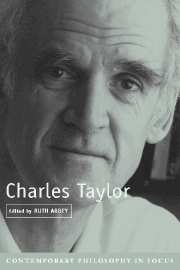Book contents
- Frontmatter
- Contents
- List of Contributors
- Acknowledgments
- Introduction: Timely Meditations in an Untimely Mode - The Thought of Charles Taylor
- 1 Taylor and the Hermeneutic Tradition
- 2 Taylor's (Anti-) Epistemology
- 3 The Self and the Good: Charles Taylor's Moral Ontology
- 4 Articulating the Horizons of Liberalism: Taylor's Political Philosophy
- 5 Toleration, Proselytizing, and the Politics of Recognition: The Self Contested
- 6 Taylor and Feminism: From Recognition of Identity to a Politics of the Good
- 7 Catholicism and Philosophy: A Nontheistic Appreciation
- 8 Taylor, “History”, and the History of Philosophy
- Bibliography
- Index
Introduction: Timely Meditations in an Untimely Mode - The Thought of Charles Taylor
Published online by Cambridge University Press: 05 June 2012
- Frontmatter
- Contents
- List of Contributors
- Acknowledgments
- Introduction: Timely Meditations in an Untimely Mode - The Thought of Charles Taylor
- 1 Taylor and the Hermeneutic Tradition
- 2 Taylor's (Anti-) Epistemology
- 3 The Self and the Good: Charles Taylor's Moral Ontology
- 4 Articulating the Horizons of Liberalism: Taylor's Political Philosophy
- 5 Toleration, Proselytizing, and the Politics of Recognition: The Self Contested
- 6 Taylor and Feminism: From Recognition of Identity to a Politics of the Good
- 7 Catholicism and Philosophy: A Nontheistic Appreciation
- 8 Taylor, “History”, and the History of Philosophy
- Bibliography
- Index
Summary
Several things mark Charles Taylor as a distinctive figure in the landscape of contemporary philosophy. Taylor has been publishing consistently and prolifically for over four decades and despite his retirement from McGill University some years ago, his intellectual energies continue unabated. He carries on writing, teaching, and addressing audiences across the world. As his magnum opus, Sources of the Self, indicates, Taylor draws on a wide range of western thinkers – both canonical and lesser known – in adducing his own approach to philosophical questions. He writes and speaks as easily in French or German as in English. Perhaps the most remarkable thing about Taylor's work is its range of concerns. Even his critics would have to concede that Taylor has made significant contributions to debates across a wide spectrum of philosophical areas: moral theory, theories of subjectivity, political theory, epistemology, hermeneutics, philosophy of mind, philosophy of language, and aesthetics. His more recent writings see him branching into the study of religion.
In a time of increasing academic specialisation, in the era of the Fachidiot as Nietzsche put it, Taylor's ability to contribute to philosophical conversations in all these areas distinguishes him as an untimely thinker. This feature of his thought can be characterised as untimely because the wide and widening span of his work means that he resembles the canonical thinkers of the western philosophical tradition more than he does most contemporary philosophers.
- Type
- Chapter
- Information
- Charles Taylor , pp. 1 - 28Publisher: Cambridge University PressPrint publication year: 2004
- 2
- Cited by

